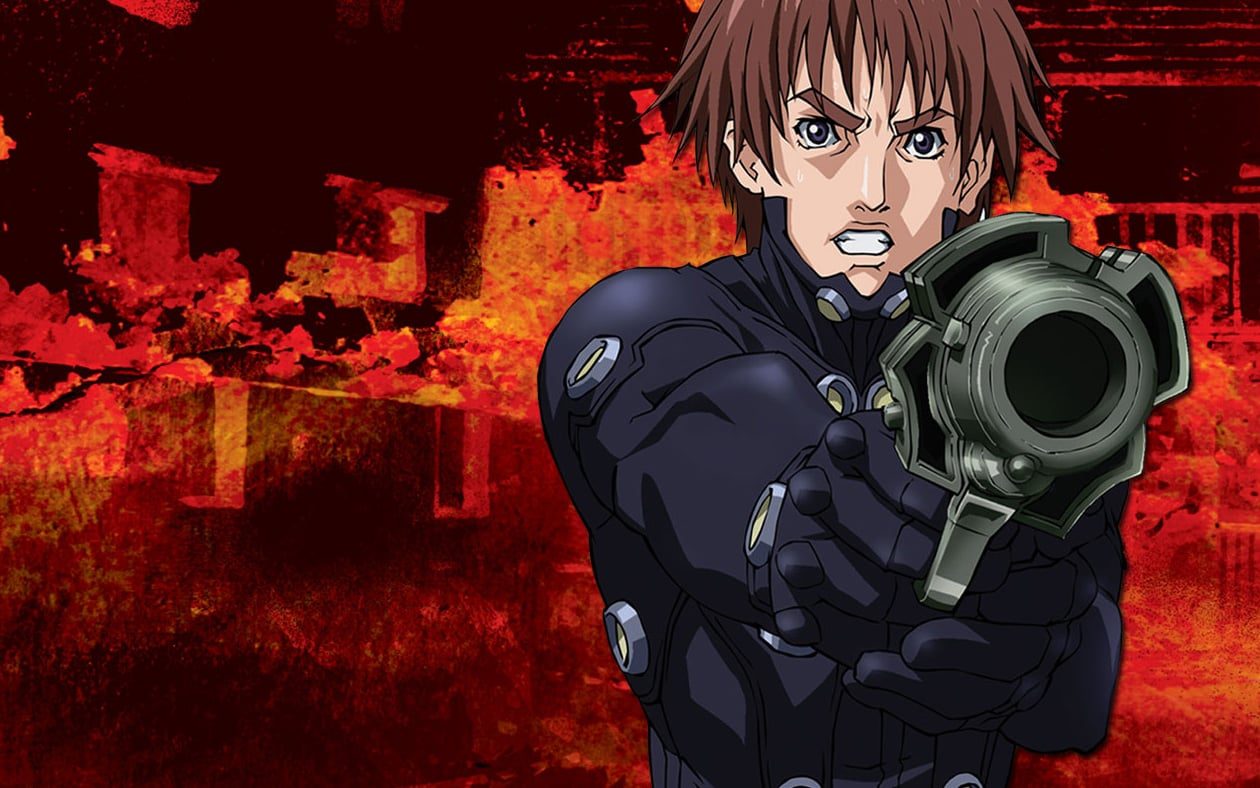Gantz, Vol. 1 by Ichiro Itano (Review)

While I was in Toronto this past September, I picked up an imported release of Gantz at one of the local anime shops. I had heard about Gantz a few months earlier, and saw that ADV was lining up to release it here in the States after a pretty intense licensing struggle, and was intrigued as much by its premise as its dark, ultra-violent style.
The series begins when two teenagers — Kei Kurono and Katou Masaru — are killed after saving a homeless man from being run over by the subway. One moment, their body parts are flying across the subway platform, the next they find themselves in a Tokyo apartment along with several other men and a mysterious black sphere. Oh, and a naked girl who appears out of thin air.
After Kei and Katou save the girl (who is named Kishimoto) from being raped, the black sphere — named Gantz — wakes up and tells them that they’re all dead. Furthermore, their lives now belong to it, meaning Gantz can do anything to them that it sees fit. Which means that they get sent out on missions to hunt down fugitive aliens that are hiding out amongst humanity. And it’s a good thing they’re sent out packing some serious weapons and special body suits that give them superpowers — because the first alien they’re hunting really loves onions. Make any sense?
Now, that all sounds like a great premise for a show, naked girls and onion-loving aliens notwithstanding. Unfortunately, Gantz botches it at nearly every turn. The series quickly devolves from what could be a great and challenging sci-fi/horror/action series into one that seems fully intent on exploring the darkest sides of human nature in a manner that is as uncompelling and boring as possible.
I have no problem with characters that are bad or unlikable, but at least make them interesting, fleshed out individuals. Unfortunately, Gantz’s characters are, simply put, morons. For example, Kei — our “hero” — spends the majority of any given episode complaining to himself about how stupid and pathetic his companions are. That, or leering at Kishimoto and wondering how long it’ll be before he can get in her pants.
Basically, this means that your average episode basically consists of lots of inane dialog between uninteresting characters about vague government conspiracies, interspersed with scenes of various exploding body parts. Occasionally, someone will wonder about their current state of existence, if they’re dead or alive, if they’ll ever be able to return home, blah, blah, blah. Oh, and there are lots of breasts, which, thankfully for all of you teenaged boys out there, will be in the North American release (after being deemed “too hot” for Japanese television).
As Gantz’s token female character, Kishimoto is basically useless. As far as the show is concerned, her entire existence seems to revolve around finding herself in one compromising situation after another — all of which seem to serve no purpose other than to give male viewers a little somethin’ extra. And it gets even better. In some of the later episodes, Kishimoto grows so despondent over her current state that she agrees to become Kei’s “pet” — which, of course, makes for a number of scenes in which he comes up with various plots and schemes to get her in bed.
This aspect of the show is by far the most disturbing, far moreso than the graphic violence, as it moves beyond simple fan service and into material that’s quite degrading. Of course, one could argue that it’s only keeping in line with the series’ dystopic outlook. And I would agree, if it didn’t feel like such a gratuitous and blatant attempt to make the series “dark” and “edgy.”
Admittedly, I’ve never read any of the manga on which the series is based, so it could be that something got lost as the series got transferred from one medium to the other. Perhaps in the original manga (which is supposed to be much better), all of this sex (and violence) served a greater purpose, and actually meant something to the plot. But that’s most definitely not the case with the anime.
Animation-wise, the episodes I’ve seen are lackluster, to say the least. Which is a real shock seeing as how GONZO was responsible for this. The animation is choppy, the CGI integration is incredibly clunky and painfully obvious, and the character designs seem to grow worse with each passing episode. Frankly, I find it a little hard to believe that the same studio behind the stellar Last Exile was also responsible for this amateurish dreck.
Gantz is being positioned as a dark, nihilistic story about mankind’s darker nature — which is pretty accurate. Unfortunately, that doesn’t mean it’s any good (I continue to be baffled by those who claim that the series possesses some deep philosophical insights). It spends so much time delving into the dark sides of its characters that it ceases being interesting. Rather, it becomes increasingly annoying and pointless. Occasionally, the series will somehow deliver a slightly compelling moment, as one of the characters might find themselves reflecting on their past life and what could have brought them to this place. But Gantz makes darn sure that intriguing scenes such as those don’t last too long, otherwise we might realize just how bankrupt the series is overall.
I’m never one to shy away from challenging, psychological content — for example, the far superior Paranoia Agent — but Gantz fails miserably as such. And I’m not one to champion mindless action, but had the series simply focused on being a solid action title, it would’ve been a vast improvement over whatever it is that this trainwreck is supposed to be.
